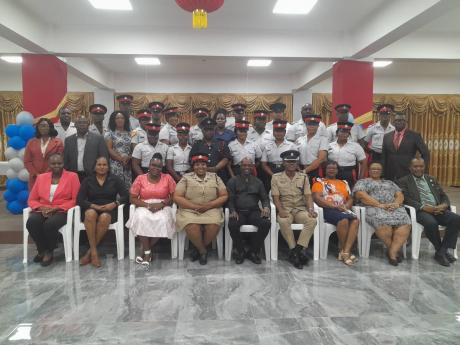First responders laud training to aid the mentally ill
It is a double murder that residents of Christian Meadows would rather not remember. But also one that police, firefighters, and other first responders in Portmore, St Catherine, cannot afford to forget.
In fact, the tragic murders of 69-year-old Cecil Ramsey and his wife, 55-year-old Phyllis, at the hands of their mentally ill son, Simeon Ramsey, two years ago, was the catalyst for a recent ‘Police Mental Health First Responders Training’ for those who serve the St Catherine South police division.
Twenty-four first responders – the majority of them police men and women, and the others: a firefighter, a social worker, and representatives of the transport authority and the municipal corporation – graduated from the programme last Thursday.
They were hailed as “pioneers” for striving to better their interactions with mentally ill citizens. Many of their peers, they admitted, believe dealing with the mentally ill is not their job.
“Why do you want to bring that back up now? Everyone has moved on. It’s not a topic anymore,” a respected resident of the Christian Meadows told The Sunday Gleaner during a visit to the community last week, referencing the killings of the Ramseys.
In her view, many residents would prefer to forget it.
“You know Jamaica is like a nine-day wonder. All I can say is that he was a very nice young man. But that is what mental illness causes,” added the resident, describing the alleged killer as jovial and always friendly in interactions.
She conceded, however, that more needs to be done to address mental health issues impacting the country, especially when they lead to tragic outcomes.
Around 4 a.m. on February 4, 2022, Simeon allegedly snapped, attacking and stabbing both parents to death inside their home.
He later confessed to the murders and was taken into custody. Reports are that a psychological evaluation last year deemed him unfit for trial. He is expected to make a court appearance later this year.
The shock value of the Ramsey case was what led stakeholders in St Catherine to acknowledge that more needed to be done to bring awareness to mental illness and its impact on the wider society, which included training first responders on best practices in dealing with the issue.
According to the Independent Commission of Investigations (INDECOM), of the approximately 235 persons who were killed by the police last year, 15 were deemed to be mentally ill. There were also reports of injuries being inflicted on the mentally ill by members of the security forces. This prompted the investigative body to call for more training and greater use of non-lethal force when dealing with persons suffering from mental health disorders.
The recent training reflected a partnership between the Jamaica Constabulary Force and the Ministry of Health and Wellness. It lasted six weeks and exposed participants to common mental health disorders and their symptoms, substance abuse disorders, counselling, de-escalation techniques, and mental health laws.
‘IT CHANGED MY OUTLOOK’
Constable Oshane Wilson, a member of the St Catherine South Special Operations team, an elite outfit that encounters regular predawn shootouts with gunmen in the division, said the training on mental health issues will come in handy in his line of work.
“Personally, it changed my outlook on how I would view mentally ill persons and the whole stigmatisation. I now know how to approach and treat a person dealing with specific mental illnesses,” offered Wilson, a graduate of the programme.
He shared the belief that many of Jamaica’s most hardened criminals suffer from mental health issues, adding that it was also common knowledge that community dons prey on the vulnerability of mentally ill persons, using them to carry out criminal activities.
“There are instances where we encounter some of these guys in non-violent situations, so this mental illness training will help us to better understand them, and may help to avert violent confrontations,” he said.
“Because of this course, we will now be able to understand that this person has a particular mental disorder, and how to treat with them.”
He also noted that the training will enable him to recognise traits of mental illness in colleagues.
CRIME PROBLEM ROOTED IN MENTAL ILLNESS
Dr Orville Taylor, head of the Department of Sociology, Psychology, and Social Work at the University of the West Indies (UWI), Mona campus, argued in his keynote address at the graduation ceremony that Jamaica’s crime problem is mostly rooted in widescale mental illness and a general lack of self-love among citizens.
Another critical factor, he pointed out, was abuse and mistreatment in the workplace, which trickles down into families and manifests itself in depression and the formation of other mental illnesses among parents and their children.
“When you mistreat a worker, you mistreat a family. And a woman or a man who has been abused is likely to go home and abuse the son or spouse,” Dr Taylor reasoned.
He noted that unfair and insecure contracts, and denial of certain rights, even in the security forces, are other contributing factors. This is particularly unhealthy for persons charged with serving and protecting the public, he said.
“What happens is that they (parents) lose the ability to keep that young man in school. And when you treat people unfairly, some of them become clinically depressed,” he explained, noting that such household conditions fuel wayward behaviour in youngsters who statistically make up the bulk of perpetrators and victims in Jamaica.
TRAIN CORRECTIONAL OFFICERS, TOO
On hearing of the mental health training initiative for first responders, Carla Gullotta, executive director of Stand Up for Jamaica, called for the inclusion of correctional officers in such programmes.
Diagnosed mentally ill persons suffer while in incarceration, where they should not be in the first place, some without a trial for lengthy periods, she argued.
“They should include correctional officers because they have so many challenges. To work with the mentally ill is very difficult because it is not exactly their expertise. So training would be useful,” said the head of the human rights group that works mainly in penal institutions.
“Still, my advocacy is not to send the mentally ill to the correctional services but to an institution where they can be treated and cured. A person who is mentally ill is not aware and is not fully capable of fully understanding what he has done. There must be another avenue than to send them to prison,” she added, noting that many mentally ill persons languish in prisons, ostracised and without proper care.
Such alternatives will be at the forefront of court discussions later this year, explained Marcus Moore, one of Ramsey’s attorneys.
“It is for us to appeal to the judge to take a particular side with him in terms of the best course of action for him because he is suffering from a dissent of the mind,” Moore told The Sunday Gleaner.
“Based on the evaluation, he was deemed unfit to plea, meaning that he does not properly understand the consequences of his actions, the magnitude and seriousness of the situations, and to give clear instructions to his lawyers.”


